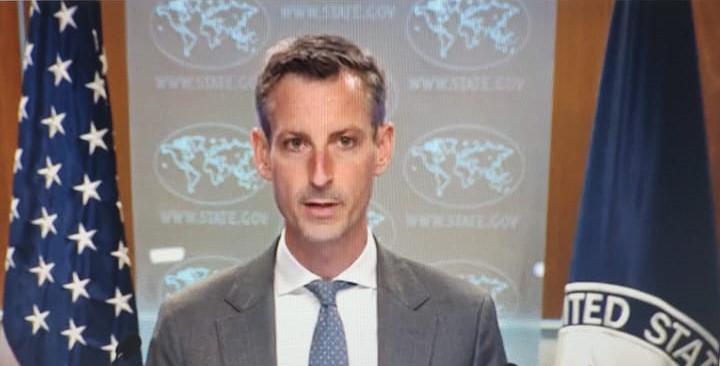State Dept Presser- Aug 17


US State Department spokesperson Ned Price held a press conference on August 17, 2022.Some excerpts
QUESTION: Okay. Can I start with Syria. What do you make, if anything, of the Syrian Government’s statement earlier today that they don’t know where Austin Tice is, they don’t have him, and they can’t help you, basically?
MR PRICE: We’ve seen that statement. We’re aware of that statement. That statement does nothing to change our fundamental position, and that is the fact that we call on the Syrian Government to ensure that Austin Tice and every U.S. national held hostage in Syria can return home. As I said just the other day when we were marking the somber anniversary of Austin Tice’s 10th year away from his family – a quarter of his life now spent away from his family – we have engaged extensively with Syrian authorities to try to get Austin home, including directly with Syrian officials, but as I mentioned at the time, Syria has never acknowledged holding him. We continue to believe that Syria has now an opportunity to help release a U.S. national. We will continue to pursue every avenue we conceivably can to secure Austin’s prompt release.
QUESTION: South Korea President Yoon Suk-yeol said at a press conference on the 100 days of his inauguration yesterday in order to realize the bold plan for North Korea, he said that he would further pursue the North Korea or in some case of pressure it through sanctions to participation in de-nuclearizations. Will the United States continue to maintain sanctions to denuclearize North Korea?
MR PRICE: We will. We will continue to maintain those sanctions until and unless the underlying conduct, the underlying activity changes and North Korea alters its fundamental approach. As I said just the other day – earlier this week, I think – we strongly support what we have heard from President Yoon. We support the ROK’s aim to open a path for serious and sustained diplomacy with North Korea. It is not only our goal, it is our shared and collective goal to see the complete denuclearization of the Korean Peninsula, and we are committed to working very closely with President Yoon, with his team, with our allies in the ROK, with our allies in Japan, trilaterally together with our Japanese and South Korean allies, but also with our broader set of allies and partners in the Indo-Pacific and beyond.
Our commitment in the face of the DPRK’s continued provocations to the security of our allies, including the ROK and Japan, of course, in the Indo-Pacific is ironclad.
QUESTION: I’m wondering if you had any response to the Chinese ambassador’s comments yesterday about congressional visits to Taiwan being inappropriate and warning of a Chinese response if the U.S. Navy sailed into the Taiwan Strait.
MR PRICE: I don’t have a specific response beyond what you have heard from us since the most recent provocation, since the most recent response from the PRC. And we have repeatedly made the point that the PRC has engaged in, in some ways dangerous, in escalatory, in aggressive military responses to what was nothing more than a peaceful visit on the part of the Speaker of the House. Congressional delegations routinely travel to Taiwan. A Speaker of the House has previously travelled to Taiwan. Such travel is entirely consistent with our “one China” policy. It is consistent with the status quo that we have sought to defend and to preserve, not only in recent months but over the course of the past four decades or so.
What we have noted – again, going back some time now – is that Beijing – it is Beijing that has stepped up its pressure on Taiwan across multiple domains. It has sought to isolate Taiwan internationally. It has sought to intimidate Taiwan with military pressure and tactics. It has sought to interfere with its democratic processes. And these actions, as I alluded to just a moment ago, beyond posing additional risks, they’ve undermined the status quo and, in turn, the underpinnings of peace and stability in the strait, in the Taiwan Strait. And what we’re seeing now appears to be just the beginning stages of an intensification of those efforts. We’ve already seen, as I alluded to a moment ago, an uptick in military intimidation tactics to an unprecedented level and an increase in coercive economic tactics. We expect these practices – these practices, these tactics, will continue in the days and weeks ahead. China – although China says that its planned military exercises have concluded, it has maintained a heightened level of air and maritime activity around Taiwan and it has made clear it will continue to do so.
So, for our part, we will continue to take steps that are resolute but also calm to uphold peace and stability in the face of Beijing’s ongoing efforts to undermine the status quo. We will continue to do all that we can consistent with our “one China” policy, consistent with the Taiwan Relations Act, consistent with the Six Assurances and the Three Joint Communiques, to support Taiwan in line with our longstanding policy. And these steps across a range of areas will unfold over the coming weeks and months because we recognize that this challenge is a long-term one. We are prepared to work with Taiwan. We’re prepared to continue to work with our allies and partners, and our support for Taiwan, as it always has been, will be commensurate with the threat that it faces.
QUESTION: Yeah, about some other military exercises involving China. The Russian exercises in the east, the Chinese are sending troops to. I wonder if that, the fact that Chinese troops are going to Russia to take part in joint military exercises, does that represent the warnings that you were giving a few months ago to China not to militarily support the Russians in the war in Ukraine? Does this sort of change your thinking in the way that the Chinese have responded to that? And is it still the case that you think the Chinese haven’t offered military support for the war in Ukraine?
MR PRICE: My understanding is that these are joint exercises that involve a number of countries well beyond Russia and China. Countries routinely make their own sovereign decisions. It is absolutely their right to do so regarding what, if any, military exercises to take part in. I’ll also note that most of the participating countries also routinely participate in a wide array of military exercises and exchanges with the United States as well. So, we don’t read anything into their engagement in this activity.
To your specific question about the provision of PRC military assistance to Russia and its effort against Ukraine, of course our concern and our admonitions have always been in the context of potential PRC military assistance or systemic assistance for – to help Russia evade the impact of U.S. and international sanctions. We’ve been very clear in our engagements with the PRC regarding the consequences of doing so. We have yet to see any change in the PRC’s behavior indicating that they are moving in that direction.
QUESTION: And you mentioned there are other countries involved in the exercises. That includes India. The fact that India is still – like you said, they take part in exercises with other countries. But doesn’t that represent a sort of failure of your approach or your attempts to create a global message against the – against Russia, like an isolation of the Russian military, the fact that a U.S. partner like India is still doing this?
MR PRICE: So, I’ll make a couple of points. One, we have conveyed the message around the world – and you recently heard the Secretary send this message during his travel in Africa; just before that he delivered this same message in the Indo-Pacific; we’ve done so in the Western Hemisphere as well – it is not that countries need to choose between the United States and any other country. It is not that we see the world in zero sum terms, all or nothing, all in with the United States or not at all. The fact is that we recognize that there are countries around the world – well, every country around the world is going to make its own sovereign decisions based on its own assessment of its interests and its values. It is incumbent upon us to make clear how our shared interests and our shared values often do align, and the dividends that countries around the world could reap from partnership.
At the same time, we also recognize that there are countries around the world that have longstanding relationships, including security relationships, with countries like Russia, for example, and reorienting a country’s foreign policy or a country’s security establishment or defense procurement practices away from a country like Russia is not something that we can do overnight. It’s not something that we can do over the course of weeks or even months. We do see this as a long-term challenge.
And to your point about Russia’s brutal aggression against Ukraine, we are confident that the brutality that Moscow has wielded inside Ukraine, the – Moscow’s unabashed trampling of the principles that have been at the core of the international order for eight decades has been a wakeup call for countries around the world. And it has helped to put a spotlight on the distinction between what countries like the United States stand for and what countries like Russia, on the other hand, stand for.
And so we are continuing – we continue to be confident that as we engage with countries around the world, as we make clear the type of partnership we seek, and the dividends that that partnership would wield for both the United States and for countries around the world, that countries will increasingly seek to partner with the United States, countries will increasingly continue to stand against what Russia’s doing in Ukraine, and the ways in which it is undermining the international order in Europe and around the world.
QUESTION: And I can’t say that I’m surprised that you declined the invitation to become the first spokesman to admit from the podium that a U.S. policy has been a failure. But that said, as it relates to India, his question about failure in your approach – but your point has been, since the invasion of Ukraine, that it can’t be business as usual with the Russians regardless of whether any of these countries have longstanding, decades-long strategic, military, economic ties with Russia and previously the Soviet Union. So, isn’t this business as usual? Isn’t this not – I mean, India, after all, is a major non-NATO ally of the U.S. It’s part of the Quad. It’s a country that you guys are building a huge – trying to build the Indo-Pacific Strategy around, or one of the three others.
MR PRICE: If you – across the wider perspective, we have worked very closely with our Indian partners bilaterally, through the Quad as well, to signal, and the Indians have done so very clearly, what should be the inviolable principle of state sovereignty. We’ve —
QUESTION: They’ve increased their imports of Russian oil. They’ve increased their imports of Russian fertilizers. They’re doing this military exercise. They’re about to buy – do what the Turks did kind of and buy – potentially buy the Russian air defense systems. Is – how is that not business as usual?
MR PRICE: It —
QUESTION: The exact – the exact same thing that you’ve been telling countries not to.
MR PRICE: It’s not for me to speak to another country’s foreign policy. But what I can do is point out what we have heard, statements from India. We have seen countries around the world speak clearly, including with their votes in the UN General Assembly, against Russia’s aggression in Ukraine. But we also recognize, as I was saying just a moment ago, that this is not flipping a light switch. This is something that especially for countries that have historical relationships with Russia, relationships that, as is the case with India, extend back decades, it is going to be a long-term proposition to reorient foreign policy away from Russia.
QUESTION: You know this is just – you guys – you said it is “not for me to speak to another country’s foreign policy.” You do that every day.
MR PRICE: It’s – it is my job – it is my —
QUESTION: That’s why you get up here every day, to speak to other countries’ foreign policy.
MR PRICE: It is my job to speak to – it is my job to speak to our foreign policy. Sometimes there’s a very close nexus between our foreign policy and that of other countries.,
QUESTION: I have a couple questions, but let me start with Vostok 2022 just to stay on this line. One of the countries that will be part of the military exercises is Belarus, whose territory is in part being used to attack Ukraine. Does that change your approach in terms of how to view those – these drills? And any message you want to send to Belarus in that context?
MR PRICE: Belarus’s participation in these exercises doesn’t fundamentally change our approach. What has fundamentally contoured our approach is the fact that the Lukashenka regime has opened Belarus’s doors. The regime has set aside what should be Belarus’s own sovereignty and independence and, in a way, its territorial integrity by permitting Russia’s forces onto, again, what should be sovereign Belarusian soil to launch a brutal, premeditated, unjustified attack against its neighbor to the south. That is, in addition to the human rights abuses, in addition to the Lukashenka regime’s clinging onto power following the fraudulent elections, in addition to its persecution of political prisoners, in addition to what it is doing to seek to trample on the civil rights and civil liberties of the Belarusian people – that is what alters our fundamental view of this regime.
QUESTION: Can we go to Iran?
MR PRICE: Sure.
QUESTION: Have you guys responded yet to the EU after reviewing Iran’s responses to their proposition?
MR PRICE: So, I don’t have much to offer you beyond what we said yesterday. As I noted at the time, we had received Iran’s comments via the EU. We are studying them. That was the case yesterday; that continues to be the case today. We are engaged in consultations with the EU as well as with our European allies on the way ahead. And you’ve heard us say again and again, especially in recent days, we ultimately agree with the bottom-line proposition of High Representative Borrell. The reason he put forward this proposal in the first place was out of recognition that what could be negotiated has been negotiated. The high representative, and the way in which he has handled this process, has certainly narrowed the scope of that conversation. It has crystalized the decision for Iran. We have been sincere, we have been steadfast in our commitment to seeking a mutual return to compliance with the JCPOA, and we’re grateful for Mr. Borrell and the efforts he’s undertaken to seek to get us there.
QUESTION: And just one more question. Can you elaborate a little bit more as to why the Biden administration is confident that the U.S. would be able to uphold the commitments that are in the current deal as it stands now given that it hinges on actions taken by Congress, and this building lifting some Iranians from the SDN list, and the like? Like, are you confident that those actions would be taken if you guys got back into the deal?
MR PRICE: Kylie, we look at this through the lens not of politics but of national security. And we are confident that a mutual return to compliance with the JCPOA remains the best and really the most effective means by which to once again verifiably and permanently constrain Iran’s nuclear program. The fact is that in the years in which we have not had a JCPOA, since May of 2018, Iran’s nuclear program has galloped forward in a way that is deeply concerning and alarming given where we were when the JCPOA was in full effect in terms of Iran’s breakout time, to where we are now with a breakout time that can be measured not in a year, not in months, but in weeks or potentially even less.
So that has – that for us is the guiding principle here. It’s the national security concerns, it is the security concerns that our partners have expressed as well. The specter of an Iranian nuclear weapon would not pose a threat only to the United States, but to allies and partners around the world. And that’s why from the start we’ve been sincere and steadfast in seeking to effect a mutual return to compliance with the JCPOA.
We understand that Congress needs to be a partner in this endeavor as well. That is why we have routinely updated our members and their staffs on the Hill regarding the status of discussions, whether those have been in Vienna, whether those have been in Doha, whether those have been remote. We will continue to do that knowing that our foreign policy is ultimately going to be much more effective if it is conducted with the full support of Congress.
QUESTION: Yeah, have you put any offer on the table to Iran for a prisoner swap?
MR PRICE: From the earliest days of this administration, we have made clear, unambiguously clear, to Iran the priority we attach to the return of the Americans and the dual nationals that Iran is wrongfully holding. I imagine you’re referring to what we heard from Iran recently. It has been our goal from the start to see these Americans released. Even before the process began in earnest in Vienna, we made that clear to Iran. During the course of negotiations in Vienna, during the course of negotiations in Doha, during the course of indirect discussions with the Iranians, we have also consistently conveyed that message in an unambiguous way to Iran.
QUESTION: Is there any serious dialogue now to release them? Is there any step that we should wait for?
MR PRICE: So, we’ve had two imperatives in this. One is to do all we can to seek the prompt and safe return of the Americans who are wrongfully detained in Iran, but also, secondly, not to do anything that could jeopardize or that could slow or that could hinder the release of Americans who are wrongfully detained in Iran. So as is typically the case, we don’t detail exactly where we are, we don’t detail the specifics of any of these engagements or these messages, but what I can say with confidence is that we have made unambiguously clear to Iran the priority we attach to this.
QUESTION: There are some reports in the Middle East that the Iranian comments stayed within the scope of the JCPOA. Can you confirm this?
MR PRICE: I can’t, and this is somewhat related to the point I was just making to Michel. Very different issue, but same principle at play. We are not going to detail publicly the state of these discussions or these negotiations. We’re making our views known privately and directly to the EU.
QUESTION: … then in Afghanistan an aid worker, Zemari Ahmadi, along with family members of his and colleagues were killed in the final U.S. airstrike before American troops withdrew in late August last year. Is the State Department still working to get other members of his family as well as aid worker colleagues out of Afghanistan? We’ve been told that there are 32 family members and colleagues who are still in Afghanistan.
MR PRICE: My understanding is that the Department of Defense have spoken to this, as they’ve noted that – the Department of Defense in coordination with other U.S. Government departments and agencies, and that includes the Department of State – but the Department of Defense continues to take steps to respond to the August 29th, 2021 airstrike in Kabul to protect the privacy of the family members, as well as to help protect their safety and security. The Department of Defense has noted that they’re not able to provide additional details at this time.
QUESTION: Also on Afghanistan – and I know you might not be able to say much here, but I want to ask about a Special Immigrant Visa applicant, Zainullah Zaki. He worked as a translator for years for U.S. forces in Afghanistan and last summer, when he and his family were desperate to escape, Secretary Blinken testified that he was aware of the case and that Afghan allies would be protected. Now, Zaki was ultimately able to escape Afghanistan. He’s in the U.S., but his visa application has been denied multiple times. I was wondering if you could tell me why and if Secretary Blinken has followed up at all?
MR PRICE: What I can tell you – well, a couple things. Of course, individual visa records are confidential so it’s impossible for me to speak to individual cases from the podium. But I can tell you that over the course of what we call Operation Allies Welcome, more than 75,000 Afghans have departed Afghanistan and have made their way to the United States where they’ve been, with the help of our resettlement partners across the country, resettled into their new communities to start their new lives here in the United States. Before any single one of those Afghans was able to reach the United States, however, they underwent rigorous vetting by our interagency partners. So everyone here has been resettled with appropriate status and through appropriate procedures, but again, it’s just not something I can speak to the specifics of any individual case.
QUESTION: On Armenia-Azerbaijan – different region. The Secretary was involved in, well, very active Karabakh diplomacy while he was traveling. And I also remember a couple weeks ago behind this podium, you mentioned – you were talking about historic opportunities. I’m just wondering what was driving your optimism back then because it was followed by ceasefire violations and we just got (inaudible). And how much of your optimism is still there given the recent developments in the region?
MR PRICE: Well, we are still working to do what we can to facilitate what we hope to see, and that is a comprehensive long-term peace between Armenia and Azerbaijan. You know that Secretary Blinken recently had an opportunity to engage with the leaders of these countries. We did so, registering our deep concern about the recent fighting in and around Nagorno-Karabakh, including the casualties and the loss of life that had resulted from that. We urged immediate steps to reduce tensions and to avoid further escalations between the parties. And the recent increase in tensions underscores, we believe, the need for a negotiated, comprehensive, and sustainable settlement of all remaining issues related to or resulting from the Nagorno-Karabakh conflict. So while we’ve seen an intensification of tensions resulting in some violence, we are going to remain committed to working with the parties. We will continue to do so bilaterally, but also with likeminded partners in the EU and through our role as an OSCE Minsk co-chair to help the countries find that long-term comprehensive peace.
QUESTION: You probably have seen Navalny’s tweets from yesterday, in which case —
MR PRICE: I’m sorry, whose tweets?
QUESTION: Navalny – Aleksey Navalny’s —
MR PRICE: Yes.
QUESTION: — in which he is criticizing the lack of generosity coming from the executive branches in Western countries – he highlights the U.S., EU, the UK – vis-à-vis the congressional or, let’s say, lawmakers’ appetite towards sanctions against Russian oligarchs. He gave very stunning numbers: out of 200 Russian oligarchs on the Forbes list, we have 40-something, 46 or 47 have been sanctioned. What is your response to that? And ahead of just a week – ahead of the six-month anniversary of the Russian war, can you telegraph any further sanctions?
MR PRICE: Well, first when it comes to Mr. Navalny, we have consistently spoken out in defense of his fundamental human rights. He – the charges that have been levied against him are politically motivated. The fact that he has been in detention, away from his family and loved ones – reportedly, even at times in solitary confinement – is a testament both to his courage, to his determination, but also to the weakness and of the cowardice of President Putin and those who would find no alternative but to incarcerate him and to detain him. That is a sign of Mr. Navalny’s strength and his effectiveness.
When it comes to our sanctions against Russia, we have made clear that we will enact, continue to use every appropriate authority to hold accountable those who are responsible for Russia’s war against Ukraine. We have done so against Head of State President Putin. We’ve done so against his key ministers: his minister of foreign affairs, his defense minister, others within his inner circle. But we have also done so vis-à-vis cronies, oligarchs, and those who have benefited from – and in turn cater to – President Putin and the Kremlin.
I can assure you that we continue to develop and to refine targets. We will continue to use appropriate authorities to pursue those who fall within the legal parameters of our sanctions authorities. Our partners are continuing to do the same, and together, we’re continuing to harmonize, harmonizing our sanctions with those of our European and other partners to ensure that we can exact maximum effectiveness.
QUESTION: Thank you. So today almost 20 former diplomats, including your colleagues and generals, published in the op-ed in The Hill calling for more and quicker military aid for Ukraine, including longer-range weapons, and suggesting that the current level of support only allows for a stalemate on the battlefield. They also take exception to the administration’s reasoning that providing longer-range weapons might lead to World War Three as Jake Sullivan said. So how do you respond to that? And also, could you explain the logic about how those weapons could lead to World War Three?
MR PRICE: So, on the broader question, we have provided an unprecedented amount of security assistance to our Ukrainian partners, some $10 billion since the start of Russia’s invasion of Ukraine on February 24th. With our partnership from Congress, there was an emergency supplemental passed of some $40 billion, as I recall. A large share of that supplemental funding was intended for security assistance. Over the course of recent months, we have enacted a number of presidential drawdowns – I believe we are on number 18 right now. There is remaining security assistance as part of that emergency supplemental funding – several billion dollars left.
And so, I can assure you that we will continue to provide all the resources that are available to us to our Ukrainian partners to see to it that they can continue to defend their country, but ultimately, to defend their democracy and to defend their freedom.
Yes, last question. A couple final questions.
QUESTION: Does the State Department – do you have any written comment on the recent decision by the Kingdom of Saudi Arabia to sentence a Saudi student to 34 years in prison, Salma al-Shehab, for following and retweeting activist dissidents? And do you have any response to the argument that the warming relations between U.S. and Saudi Arabia have given that government a sense of impunity leading to some of these harsher sentences?
MR PRICE: As it pertains to this particular case, we are studying the case. We are studying the sentence. But I can say this as a general matter and I can say this without any caveat, and resolutely: Exercising freedom of expression to advocate for the rights of women should not be criminalized. It should never be criminalized. Freedom of expression is a principle that we stand up for around the world. Any time any government anywhere tramples on such a principle, we speak out and we seek to defend that fundamental right. That is as fundamental to individuals in Saudi Arabia as it is to any country around the world.
To the second part of your question, far from, I think, giving Saudi Arabia license to act with greater impunity, our engagement, including the senior-level engagement that we’ve had with Saudi authorities – and this includes with President Biden, Biden’s recent visit to the kingdom – has made clear to our Gulf partners in the context of the GCC, but also to the Saudis in the context of our bilateral discussions, the fact that human rights is central to our agenda. It is always on our agenda. And it is always high on our agenda.
QUESTION: … do you have anything you want to say about President Abbas’s comments yesterday in Germany?
MR PRICE: Deborah Lipstadt, who is our special envoy for anti-Semitism, did tweet about this. She wrote yesterday that President Abbas’s claim that Israel has, quote-unquote, “committed 50 Holocausts” is unacceptable. Not only of course is it a lie, but we know that Holocaust distortion can have dangerous consequences and can fuel anti-Semitism. We have seen that throughout the course of history. We recognize that President Abbas today has, quote, reaffirmed that the Holocaust is “the most heinous crime” in modern history, and we reject any attempts to draw false equivalencies or to minimize Holocaust atrocities.
QUESTION: Any comment on UN gen-sec’s meeting tomorrow with President Zelenskyy and Erdo?an?
MR PRICE: So, it’s our understanding that the meeting will take place tomorrow. Of course, there are a number of important issues that Secretary General Guterres, that President Zelenskyy, President Erdo?an can be in a position to discuss. The fact that the meeting will take place where it is suggests that there will be a heavy focus on food security and the efforts that Turkey has undertaken to facilitate the free flow – or the freer flow – of grain out of Ukraine’s Black Sea ports.
We very much appreciate Turkey’s efforts, together with those of the UN secretary general, together with those of Ukraine to see to it that ships are once again sailing from Ukraine’s Black Sea ports. At latest count, more than 20 ships laden with grain, laden with crops, laden with foodstuffs have set sail from Ukraine. The vast majority of those have made it through the inspection station and are now sailing to their ultimate destinations. That is unambiguously a good thing.
QUESTION: Any updates on the talks that the Turkish delegation has been making in D.C. regarding the F-16 deal?
MR PRICE: What I can say – well, first, as you know, we don’t publicly comment or confirm proposed defense transfers until they’re formally notified to Congress. But meetings are ongoing regarding Turkey’s F-16 sustainment request, and a Turkish delegation has travelled to the United States to take part in related discussions. But we’d refer you to Turkish authorities to speak to their defense procurement plans.
QUESTION: Yeah, on Iraq, please. As you well know, the power struggle in Iraq is worsening. And given the fact that U.S. has – the stake is high for the United State, are you taking side? Are you in touch with some party in Iraq? Are you doing something in this regard?
MR PRICE: We are not taking sides. We are prepared to work with the government that puts Iraqi sovereignty and the best interests of the Iraqi people at the heart of its agenda. We hope to see a government form that does just that and a government that is able to deliver for the best interests of the Iraqi people.
Thank you.
(The briefing was concluded at 2:34 p.m.)
TAGS
AfghanistanArmeniaAzerbaijanBelarusChinaIndiaIranIraqKosovoNorth KoreaPalestinian TerritoriesRussiaSaudi ArabiaSerbia
-
Book Shelf
-
 Book Review
DESTINY OF A DYSFUNCTIONAL NUCLEAR STATE
Book Review
DESTINY OF A DYSFUNCTIONAL NUCLEAR STATE
- Book ReviewChina FO Presser Where is the fountainhead of jihad?
- Book ReviewNews Pak Syndrome bedevils Indo-Bangla ties
- Book Review Understanding Vedic Equality….: Book Review
- Book Review Buddhism Made Easy: Book Review
- Book ReviewNews Elegant Summary Of Krishnamurti’s teachings
- Book Review Review: Perspectives: The Timeless Way of Wisdom
- Book ReviewNews Rituals too a world of Rhythm
- Book Review Marx After Marxism
- Book Review John Updike’s Terrorist – a review
-
-
Recent Top Post
-
 CommentariesTop Story
India’s Migration Dilemma
CommentariesTop Story
India’s Migration Dilemma
-
 Commentaries
Crowd Management Blues
Commentaries
Crowd Management Blues
-
 Meher Baba SpeaksNews
Meher Baba Loved Them Too…
Meher Baba SpeaksNews
Meher Baba Loved Them Too…
- Commentaries Record Pentagon spending bill and America’s hidden nuclear rearmament
-
 CommentariesNews
Ides of trade between India and Pakistan
CommentariesNews
Ides of trade between India and Pakistan
-
 Commentaries
How sustainable is the rhetoric of India-China Bhai-Bhai
Commentaries
How sustainable is the rhetoric of India-China Bhai-Bhai
-
 CommentariesTop Story
New Set of Diplomatic Strains with Canada
CommentariesTop Story
New Set of Diplomatic Strains with Canada
-
 News
Ratan Tata’s Legacy
News
Ratan Tata’s Legacy
-
 Commentaries
India’s Strategic Push on the World Stage
Commentaries
India’s Strategic Push on the World Stage
- Commentaries Veils of Resistance
-
AdSense code
















